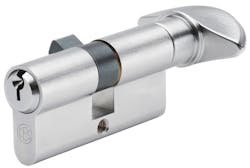It might not be a brand name that’s as common as a Schlage or a Kwikset, but it’s one that locksmiths likely will encounter at some point: CES.
CES is the brand of C.Ed. Schulte GmbH, which is the oldest manufacturer of cylinder locks in Germany. CES sells Schlage-C cylinders and mortise locks in the United States and has been doing so for nearly two decades, according to Marius Klett, international area sales manager for C.Ed. Schulte. CES cylinders can be found in high-end U.S. homes as well as offices and shops, among other locations.
There’s nothing special about a CES cylinder, Klett says. “CES cylinders are pinned the same way as products of other American manufacturers, from the bottom, and can be rekeyed to existing key systems.”
Although you might not be familiar with CES, it’s more likely that you are with LAB. LAB has sold CES tools and key blanks since 2018. It also has a complete rekeying kit, which includes LAB-made pins for CES cylinders.
“The pin sizes are slightly different in comparison to other cylinders,“ Klett notes about CES’ cylinders. “But regular Schlage pins can be used, as well as Schlage key blanks. However, we recommend to use CES key blanks to guarantee correct function of the cylinder.”
Klett says CES cylinders can be used in a masterkey system, either keyed alike or keyed different, and CES cylinders can be produced in one of 47 finishes, from black to brass and chrome-plated.
Euro Cylinder Tips
C.Ed. Schulte also works with door and window manufacturers, so a locksmith might encounter the company’s European profile cylinder — the so-called Euro cylinder. A noted problem of Euro cylinders is the ease with which criminals can “snap,” or break off part of, the cylinder and gain entrance to a door. It isn’t difficult to find video of professionals performing a snap in less than a minute.
One way of preventing such an attack is to install the Euro cylinder flush against the door, not the lock’s faceplate. Klett says the standard in Germany is that the lock stands out no more than 3mm (about one-eighth of an inch) to prevent snapping attacks.
“Of course, this is not a full protection but a start,” he adds.
However, CES also sells “anti snap” cylinders that carry British Kitemark certification. These cylinders have a predetermined breaking point and a locking mechanism that ensure that someone carrying out a snap attack can’t gain access to the cam and, thus, enter the premises. The cam also has hardened metal elements that protect against drilling. Meanwhile, a person inside still can lock and unlock the cylinder.
CES sells its cylinders in the United States through Strybuc Industries and Bridgeport Worldwide and provides pinning manuals as well as installation instructions through its website: www.ces.eu/en_us.
For more information about LAB’s pin kits and CES accessories, go to www.labpins.com or call LAB at 800-243-8242.
About the Author
Will Christensen
Senior Editor
Will Christensen is senior editor at Locksmith Ledger International. He has been an editor and reporter at magazines and newspapers for more than 30 years.
